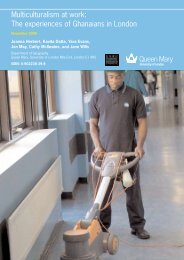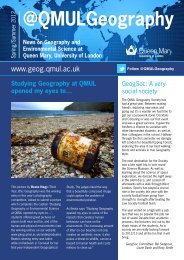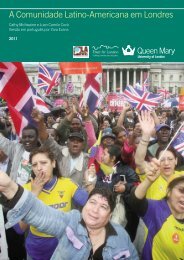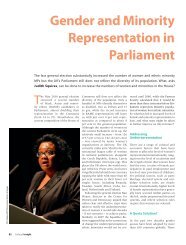Gender and Ethnic Identities among Low-paid Migrant Workers in ...
Gender and Ethnic Identities among Low-paid Migrant Workers in ...
Gender and Ethnic Identities among Low-paid Migrant Workers in ...
- No tags were found...
You also want an ePaper? Increase the reach of your titles
YUMPU automatically turns print PDFs into web optimized ePapers that Google loves.
Portuguese <strong>and</strong> try<strong>in</strong>g to mix <strong>in</strong> with us! I have already taught many people, - Thank you<br />
<strong>and</strong> please! And because they had asked me to, I taught them swear<strong>in</strong>g as well”.<br />
For women migrants work<strong>in</strong>g <strong>in</strong> clean<strong>in</strong>g or care work, their occupational identities were described<br />
as deeply fem<strong>in</strong>ised <strong>in</strong> relation to hegemonic notions of ‘natural’ car<strong>in</strong>g <strong>and</strong> nurtur<strong>in</strong>g roles of<br />
women rooted <strong>in</strong> the private sphere of the home (Laurie et al. 1999). Hellen, a care worker from<br />
Ghana, discussed how she had tra<strong>in</strong>ed to be a nurse but really only had to learn the technical<br />
elements as the rest was <strong>in</strong>nate:<br />
“So what happen, I went to do my Access to Nurs<strong>in</strong>g, even though I had the care stuff like,<br />
you know what I mean, as a woman, there’s a say<strong>in</strong>g that as a woman, you have to care for<br />
somebody, it was <strong>in</strong> me, though but I didn’t have any theoretical knowledge <strong>in</strong> care … I<br />
love car<strong>in</strong>g for people. I love to look after vulnerable people, last year I left college to look<br />
after my mum, my gr<strong>and</strong>ma back home <strong>and</strong> my auntie’s a nurse <strong>and</strong> that used to motivate<br />
me”.<br />
Thus, women migrants tended to reiterate that their jobs reflected their roles <strong>in</strong> the home. Daisy, a<br />
cleaner on the Underground from Zimbabwe noted that her job was, “Clean<strong>in</strong>g. Like domestic.<br />
Like you are do<strong>in</strong>g <strong>in</strong> the house, clean<strong>in</strong>g, wip<strong>in</strong>g everywhere, yeah that’s the job I’m do<strong>in</strong>g”.<br />
While these patterns reflected traditional patterns of what was deemed to be women <strong>and</strong> men’s<br />
work, there was some subversion of these traditional stereotypes, especially <strong>among</strong> men who<br />
worked <strong>in</strong> clean<strong>in</strong>g <strong>and</strong> care sectors. In turn, it emerged that men developed a range of<br />
compensatory strategies <strong>and</strong> rationales for cop<strong>in</strong>g with the challenges to their mascul<strong>in</strong>ity (see also<br />
Guerrier <strong>and</strong> Adib 2004; Lupton 2000; Simpson 2004). These strategies <strong>in</strong>volved highlight<strong>in</strong>g<br />
certa<strong>in</strong> aspects of their job over others, justify<strong>in</strong>g their occupations <strong>in</strong> particular ways l<strong>in</strong>ked both<br />
with social <strong>and</strong> cultural roles <strong>in</strong> their home countries, <strong>and</strong> <strong>in</strong> terms of the economic exigencies they<br />
faced as migrants. Few male migrants explicitly acknowledged that their work was traditionally<br />
associated with women. Instead, they stressed that clean<strong>in</strong>g <strong>in</strong> particular was not someth<strong>in</strong>g they<br />
were used to, but someth<strong>in</strong>g that they learnt from, as Carlos, a cleaner form Honduras noted: “It<br />
was very difficult for me because I had never held a vacuum cleaner <strong>in</strong> my life, a Hoover, never.<br />
And clean<strong>in</strong>g, I had never cleaned <strong>in</strong> my life. It’s true … It was difficult, but you have to learn<br />
everyth<strong>in</strong>g <strong>in</strong> this life”. In the same way, Abiodun, a tube cleaner from Nigeria said that his job<br />
was the worst th<strong>in</strong>g he’s ever done <strong>in</strong> his life: “I’ve never done clean<strong>in</strong>g job <strong>in</strong> my life, never. It’s<br />
15
















